Behavior Analysis and Artificial Intelligence
Your core training in AI literacy.
Start with the Foundations Course—your core training in AI literacy. Then choose one of six role-specific tracks tailored to how you practice, supervise, lead, or teach.
Understand how AI works (and doesn’t), why ethical practice requires technical fluency, and how to evaluate tools without vendor spin.
Start with the Foundations Course, your core training in AI literacy, then choose one of six role-specific tracks tailored to how you practice, supervise, lead, or teach.
- Behavior Analysis and Artificial Intelligence: RBT® and Direct Care Staff
- Behavior Analysis and Artificial Intelligence: BCBA®
- Behavior Analysis and Artificial Intelligence: Clinical Director
- Behavior Analysis and Artificial Intelligence: Organizational Leadership
- Behavior Analysis and Artificial Intelligence: Strategic Leadership and Governance
- Behavior Analysis and Artificial Intelligence: Academic Researcher
Shared core. Role-specific depth.
Take the Foundations course, then add the track most relevant to your professional role. Wearing multiple hats? Enroll in each track that fits your responsibilities.
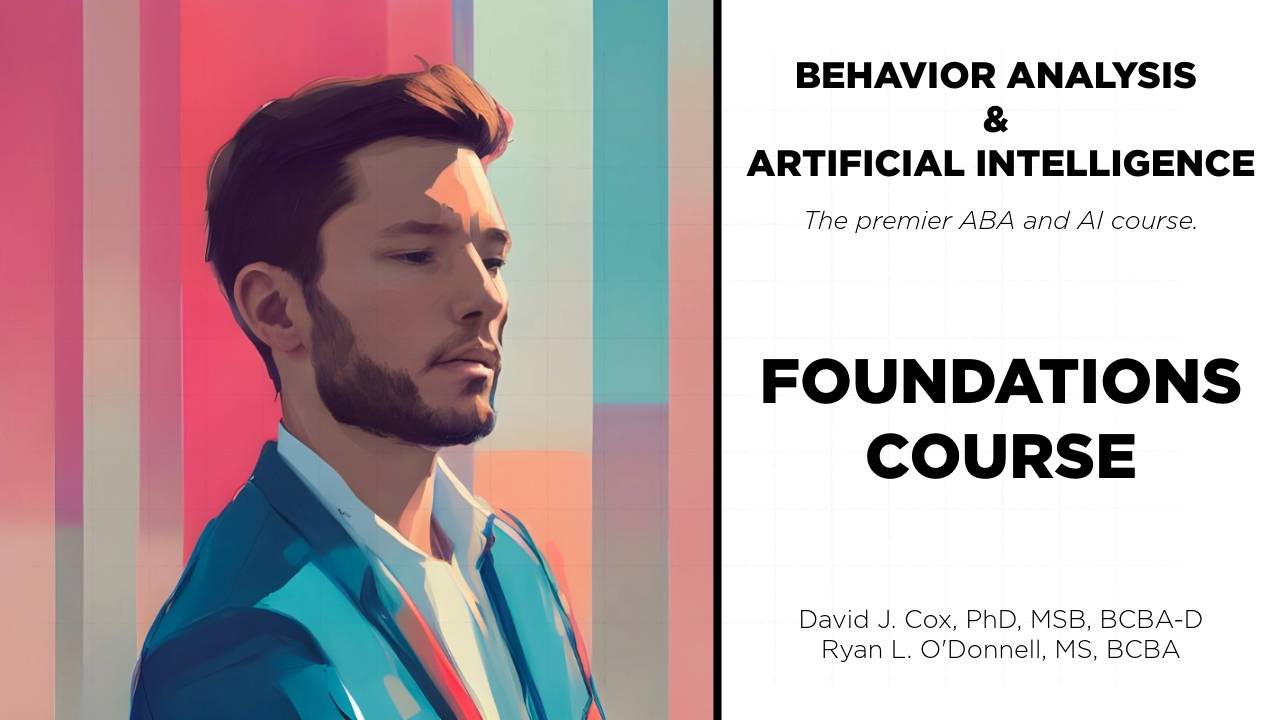
Behavior Analysis and Artificial Intelligence: Foundations
This is the first course in our AI Literacy Series for ABA Professionals. This self-paced, foundational course gives anyone working in ABA the skills to evaluate, integrate, and lead with AI—without hype and without falling behind. Built on contextualist principles, it emphasizes ethical integration and healthy skepticism, and is designed for every level of practice. During checkout, role-specific add-ons (e.g., RBT®, BCBA®, Clinical Director, Strategic or Organizational Leadership, Academic Researcher) are available.
$29.99 USD
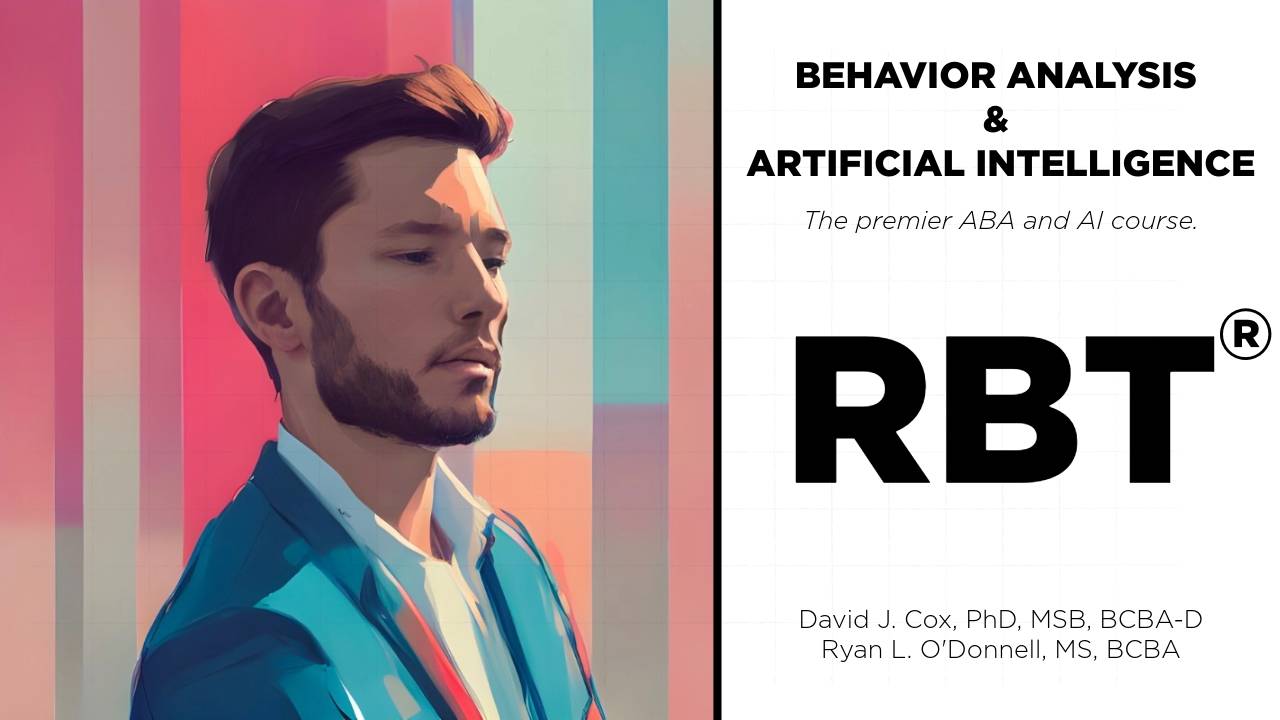
Behavior Analysis and Artificial Intelligence: RBT®
This RBT® role-specific course builds on the Foundations course in our AI Literacy Series for ABA Professionals. This self-paced program is designed for direct care staff (e.g., RBT®) and focuses on practical, ethical AI use in data collection, session preparation, and communication with your supervising BCBA® and organizational team.
$19.99 USD

Behavior Analysis and Artificial Intelligence: BCBA®
This BCBA® role-specific course builds on the Foundations course in our AI Literacy Series for ABA Professionals. This self-paced program is designed for BCBAs® and focuses on practical, ethical AI use in supervision, treatment planning, collaboration with direct care staff and organizational leadership, and critically vetting vendors and their product claims.
$19.99 USD
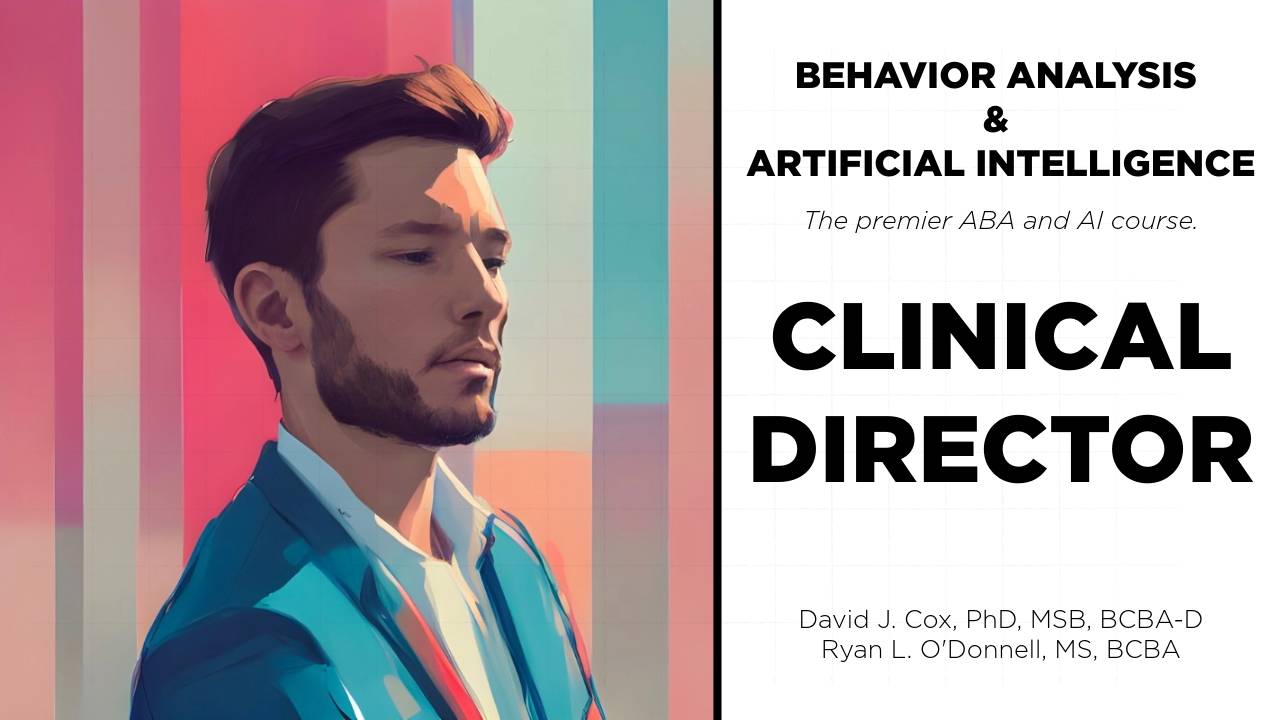
Behavior Analysis and Artificial Intelligence: Clinical Director
This Clinical Director role-specific course builds on the Foundations course in our AI Literacy Series for ABA Professionals. This self-paced program is designed for clinical leaders and focuses on practical, ethical AI use in program oversight, staff development, organizational policy, and effectively vetting marketing materials and claims provided by vendors.
$9.99 USD
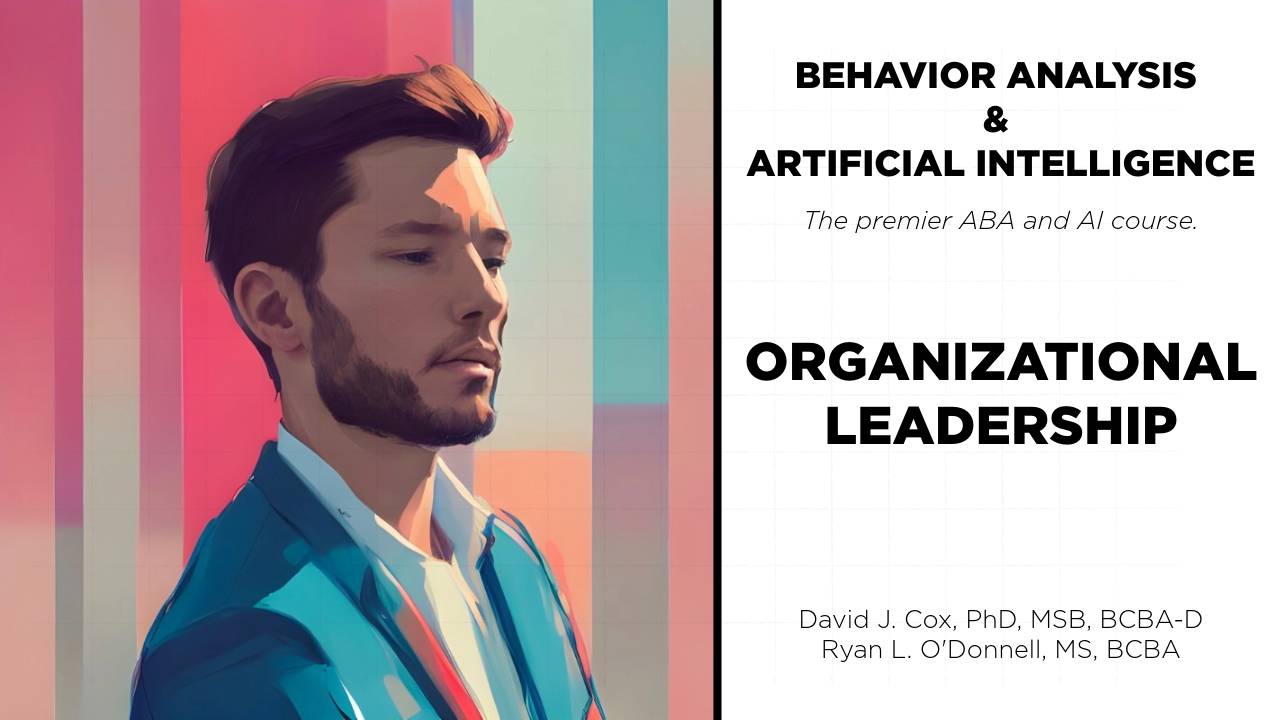
Behavior Analysis and Artificial Intelligence: Organizational Leadership
This Organizational Leadership role-specific course builds on the Foundations course in our AI Literacy Series for ABA Professionals. This self-paced program is designed for senior leaders in ABA, including Regional Directors overseeing multiple sites or programs, VPs of Clinical Services, Directors of Training & Development, Founders of ABA startups or private practices, and Directors of Compliance and Quality Assurance. Topics focus on practical, ethical AI use in strategic planning, policy development, vendor and technology vetting, and guiding organization-wide AI adoption in alignment with professional and ethical standards.
$9.99 USD
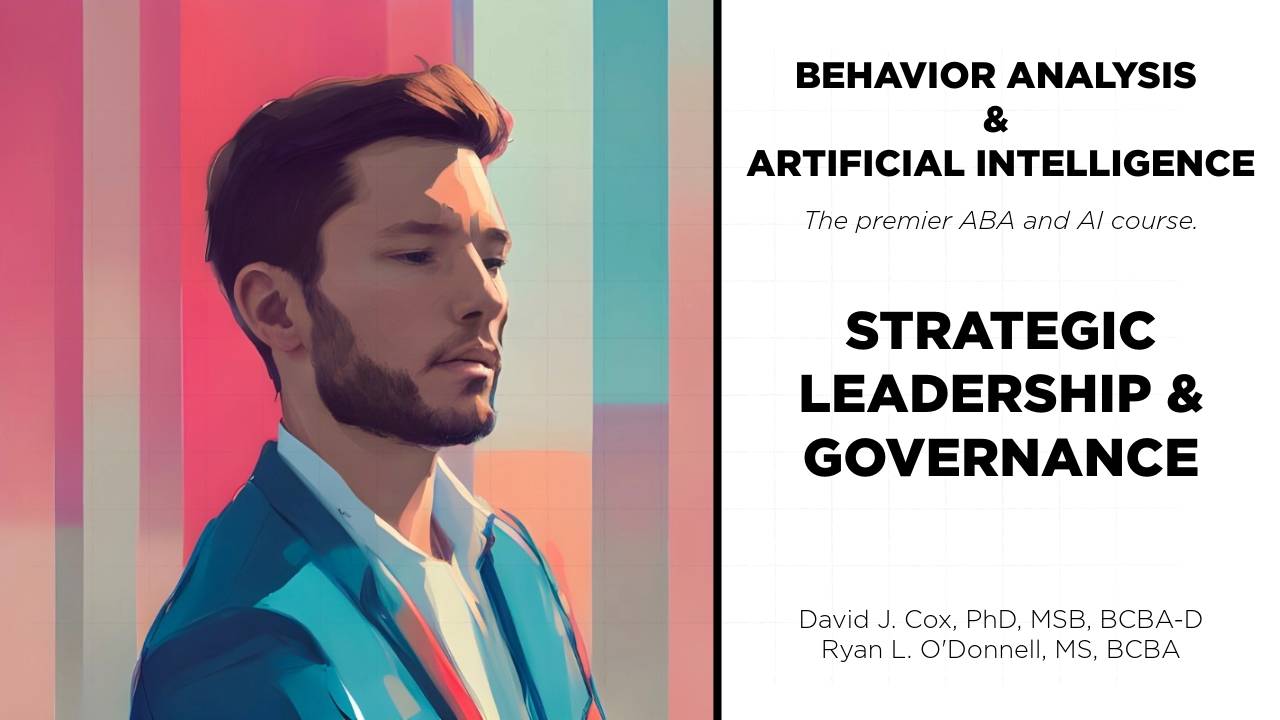
Behavior Analysis and Artificial Intelligence: Strategic Leadership and Governance
This Strategic Leadership & Governance role-specific course builds on the Foundations course in our AI Literacy Series for ABA Professionals. This self-paced program is designed for executives and governance leaders shaping the future of ABA at the organizational, industry, or policy level, including CEOs, COOs, University Program Chairs, Deans, Professional Association Leaders, and Research Center Directors. Topics focus on ethical AI adoption at scale, developing governance frameworks, influencing policy, setting industry standards, and balancing innovation with client safety across the profession.
$9.99 USD

Behavior Analysis and Artificial Intelligence: Academic Researcher
This Academic Researcher role-specific course builds on the Foundations course in our AI Literacy Series for ABA Professionals. This self-paced program is designed for faculty, doctoral researchers, and scholars advancing the science of behavior analysis. Topics focus on practical, ethical AI use in research design, data analysis, grant writing, academic publishing, interdisciplinary collaboration, and critically vetting AI tools for validity, reliability, and alignment with behavior-analytic principles.
$9.99 USD
Tiered discounts for 5-50+ seats, bulk codes, and invoice/PO options. Email for a quote or email below.
Email for Bulk Seats, Codes or POProject Chiron
Beyond the course: weekly updates, tools, and commentary to sharpen your AI literacy. Every Friday.
A New Dawn for Behavior Analysis in the Age of AI
Read the first publication of the Project Chiron newsletter, Ryan L. O'Donnell, MS, BCBA and David J. Cox, Ph.D., M.S.B., BCBA-D, introduce the mission behind the AI Literacy Series for behavior analysts. You'll learn why AI is not just a tech buzzword but a force already shaping the future of clinical practice, education, and organizational behavior analysis.
READ HERE

A New Dawn for Behavior Analysis in the Age of AI
We are proud to launch Project Chiron—a bold, structured, and unapologetically rigorous initiative to empower every behavior analyst with the skills, frameworks, and fluency required to effectively and ethically engage with artificial intelligence in a way that is informed, critical, and transformative.

AI and Behavior Analysis — Why It Matters
At its core, AI is a system of contingencies: a feedback engine tuned by reinforcement histories encoded as data. This makes it behaviorally relevant by default, not by exception.

Ground Zero for Technical Understanding: AI is Math, Not Magic
Fundamentally, AI is math, not magic. And although learning the math behind AI sounds intimidating, here’s the good news: you don’t need a PhD in maths to build real fluency. Instead, you need conceptual clarity, the same way we teach reinforcement schedules before diving into cumulative records.
Next Publication
We publish every Friday—no surprises, no clutter. Each week’s issue gives you a straight look at how AI is reshaping the work of behavior analysts, from ethical dilemmas to real-world tools to philosophical implications. Think of it as your weekly system check-in—clean, insightful, and written by professionals who get what you do.
00
DAYS
00
HOURS
00
MINS
00
SECS
About the Creators
Project Chiron was created by Ryan O’Donnell, MS, BCBA and David J. Cox, Ph.D., M.S.B., BCBA-D to bridge behavior analysis and artificial intelligence. Together, they built the course and companion newsletter to give every behavior analyst—from RBT® to professor—the tools to use AI ethically, effectively, and with confidence.
David J. Cox, Ph.D., M.S.B., BCBA-D
A full-stack data scientist and behavior analyst with nearly two decades of experience at the intersection of behavior science, ethics, and AI. Dr. Cox is a thought leader on ethical AI integration in ABA and the author of the forthcoming commentary Ethical Behavior Analysis in the Age of Artificial Intelligence. He’s published over 70 articles and books on related topics in academic journals and, quite possibly, the only person in the field with expertise in behavior analysis, bioethics, and data science.


Ryan L. O'Donnell, M.S., BCBA
With a background in behavior science and digital storytelling, Ryan stopped short of the Ph.D. track to build a distinctive path through filmmaking, science communication, and CEU production. Known for producing high-quality, film-level CEU content with thought leaders like Patrick C. Friman, Susan G. Friedman, and Kent Johnson, he’s directed and produced over 200 hours of online courses, including the acclaimed documentaries This Way of Thinking, The History of Applied Behavior Analysis: Part 1 and The Morningside Model.






